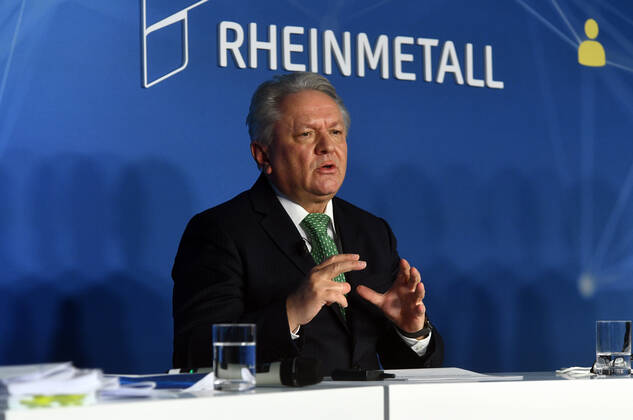Daily reminder that Putin's army of invasion was trained on the Rheinmetall-built training centre Mulino. In 2014 they "left" and construction was finished by "Гарнизон" company, probably a proxy. 100% of its imports came from Germany, last Rheinmetall shipments coming in 2019 

In 2011 Rheinmetall got a contract for building a training center in Mulino, Nizhny Novgorod Oblast. They modelled it after the training center of Bundeswehr in Altmark. They planned to build "the most advanced system of its kind worldwide" 

Mulino started in 2011 was the high point of Serdyukov's reforms. Two things you must understand about Serdyukov ministry:
1. No other minister of defence made such a big focus on the land army
2. No other minister of defence was so eager to import ready solutions from the West
1. No other minister of defence made such a big focus on the land army
2. No other minister of defence was so eager to import ready solutions from the West

Russian media was pretty open about it back then. See an article from 2011 kp.ru/daily/25636.4/… Now their straightforwardness may sound weird. Back then it was normal. Russia really started to hide its degree of cooperation with Western (German mostly) partners only after 2014 

They say that Rheinmetall "rebuilt" it. Not quite true. Gorohovetsky centre in Nizhny Novgorod Oblast is the largest in Russia. But it got obsolete. So new German-built Mulino was created very close to it, but on a new field. It was easier to build from scratch than modernize
In September 2021 Vladimir Putin visited Mulino to see the main phase of the Russian-Belarusian strategic manoeuvres "West-2021". Few months later the same troops were sent in Ukraine. Check Kremlin's website kremlin.ru/events/preside… 

Mulino was finished in 2020 (FYI: the last Rheinmetall shipments are dated by 2019). My sources say though that Mulino doesn't meet the planned standards. Russian proxies were stealing too much. Otherwise Russians might have the NATO-level training centre
(Putin in Mulino, 2021)
(Putin in Mulino, 2021)

You see Putin coming to the West-2021 manoeuvres with Minister of Defence Shoygu and the Chief of General Staff Gerasimov
The sign says: "Putin came to the main phase of manoeuvres in Nizhny Novgorod Oblast"
Indeed. The only modern Western built centre Mulino is located here
The sign says: "Putin came to the main phase of manoeuvres in Nizhny Novgorod Oblast"
Indeed. The only modern Western built centre Mulino is located here

That's Klaus Eberhardt who signed the deal to build Mulino in 2011 as the CEO of @RheinmetallAG
I urge the media to question this person regarding his role in building the Putin's war machine. He started construction of the centre to train the future Russian army of invasion
I urge the media to question this person regarding his role in building the Putin's war machine. He started construction of the centre to train the future Russian army of invasion

That's Armin Papperger, @RheinmetallAG CEO since 2013
I urge the media to question this person regarding Rheinmetall's ties with the Russian "Гарнизон" company that finished Mulino after Rheinmetall "left" in 2014. Did he supply them with equipment to finish Mulino *after* 2014?
I urge the media to question this person regarding Rheinmetall's ties with the Russian "Гарнизон" company that finished Mulino after Rheinmetall "left" in 2014. Did he supply them with equipment to finish Mulino *after* 2014?

We urgently need the investigation of @RheinmetallAG involvement in building Mulino, the only modern Western-standard training centre that Russia has. That's where Putin's army of invasion was trained. That's where he launched his last strategic manoeuvres before marching West 

@RheinmetallAG CEO Klaus Eberhardt started building the Truppenübungsplatz Altmark-modeled training centre for Putin in 2011. And there are strong indications that the CEO Armin Papperger continued the project *after* 2014 through via a Russian proxy "Гарнизон". See data for 2019 

Until a few days ago a press release about the @RheinmetallAG winning "a major order in Russia" (=Mulino) was still on their website rheinmetall-defence.com/en/rheinmetall…. It was there on July 5 when I wrote a thread on their role in building the Putin's war machine
Since then they deleted it
Since then they deleted it
Well, I knew that the @RheinmetallAG are gonna to delete the article on their involvement in building Putin's best training centre where the Russian army was preparing for their march west
That's why I screenshoted it


That's why I screenshoted it



Once again, I urge the media to investigate the @RheinmetallAG role in preparing the Putin's army for the war. That includes their connections with the Гарнизон company which was finishing the construction after the Rheinmetall "left" Mulino in 2014. Question CEO Armin Papperger
I also urge the media to investigate:
1. Other (German) suppliers of "Гарнизон" which was building Putin's training Mulino
2. German politicians who allowed this to happen. Did they do it knowingly? That must be investigated
1. Other (German) suppliers of "Гарнизон" which was building Putin's training Mulino
2. German politicians who allowed this to happen. Did they do it knowingly? That must be investigated
Putin's war machine is fully import dependent. It was supplied from all over the world. In very rare cases it had such exotic equipment suppliers as Turkey, Brazil or China. Most equipment however is Western/Japan/Tigers. It's *not* Chinese. And most importantly, German
No other nation bears so massive and so direct responsibility for preparing Putin's army for this war as Germany. In this regard I find German stance quite cynical. It were your companies that armed Putin and your politicians that allowed it to happen. Investigate them. The end🧵
• • •
Missing some Tweet in this thread? You can try to
force a refresh





